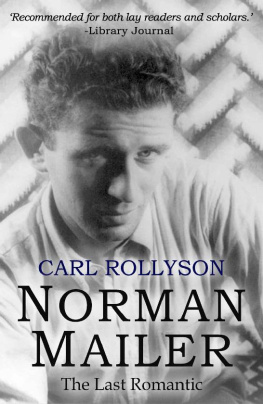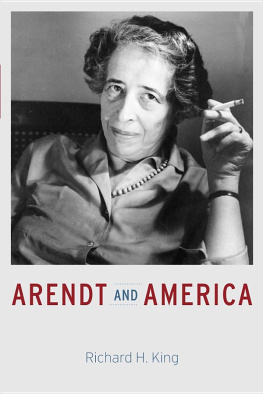CONTENTS
: How Our Family Broke Up
: At War with Allen Ginsberg
: Going Too far for the Trillings
: Another Part of the Forest: Lillian Hellman
: Hannah Arendts Jewish Problemand Mine
: A Foul-Weather Friend to Norman Mailer
: Requiem for a Lost World
INTRODUCTION
HOW OUR FAMILY
BROKE UP
I HAVE OFTEN SAID THAT IF I WISH TO NAME-DROP, I have only to list my ex-friends. The remark always gets a laugh, but, in addition to being funny, it has the advantage of being true.
Of course, the main subjects on whom I concentrate here represent only a small sample of the ex-friends I have made whose names are famous enough to be worth dropping. The reason I have decided to focus on these half-dozen in particular is that all of them were once, and for a considerable period of time, very close to me. This was true even of Allen Ginsberg, whose closeness consisted not in a genuine friendship but in the many years we went back and the recurrent visions and dreams he had about me. As it happens, these special ex-friends were all Jewish in one way or another, perhaps because the literary-intellectual milieu in which I lived was predominantly Jewish, or perhaps because some tribalistic instinct of which we were loftily unaware drew us together.
Nevertheless, I can claim with all due deference to current law and fashion that I am an equal-opportunity maker of famous ex-friends, as will become clear from the many eminently droppable non-Jewish names that crop up throughout the chapters that follow. I was closer to some of these people than to others, but to none was I as close as to the ones I focus on in this book, and my friendly relations with most of them lasted a much shorter time. A few of these latter make cameo appearances whenever their presence is required by the stories of the leading characters. Still otherssome of them still well known and some (sic transit) with names once considered worth dropping but now almost entirely forgottenare also mentioned in passing. But even adding all these to the main characters does not begin to exhaust the list of famous people whose friendship I have managed to lose or throw away in the past thirty years.
Thirty years. That means from the late 1960s, when I was approaching forty, to the present. Before the late 1960s, I was much better at making friends of strangers than at making enemies of friends. Strange as it may seem to those who have come to know me in my rather reclusive dotage, as a young man I was very outgoing and gregarious and curious about other peoplewhat they were like, what they did, and how they did it. It will seem even stranger to my more recent acquaintances that in my younger years I was also full of fun, as Norman Mailer confirmed when he said that I was merrier in the old days. The same word was once used by Max Lerner, the historian and columnist (now among the almost forgotten), who after spending a few days in my company at a conference described me (to general agreement) as the merry madcap of the group.
Obviously, not everyone I met liked me; nor did I like all of them. Indeed, not all of the people who I thought liked me actually did. There were also always those I rubbed the wrong way (sometimes to the point of outright enmity) by being too brash or too arrogant or too ambitious or too precociously successfulor by not being inhibited or tactful enough to refrain from writing about my career, especially in Making It, which came out in the late 1960s. But all that being said, the fact remains that I was more popular than not in the circles I frequented and that I always had many close friends and many more friendly acquaintances.
An interesting measure of the personal standing I enjoyed is what happened when I beganas I would call the process in the title of a book published about ten years after Making Itbreaking ranks with the dogmas and orthodoxies of the world in which I lived. What happened was that it did not occur to anyone to invoke the classical leftist explanation that I was selling out for money and/or power. In my case, because I seemed to be destroying rather than advancing my career, the theory circulated that I had gone mad. One of my best friends at the time even tried to persuade my wife to have me committed to a mental institution before my clearly self-destructive actions had a chance to reach their consummation in literal self-destructionthat is, suicide. He did this not out of hostility or spite but out of love: it was his way of excusing and forgiving what would, if I were sane enough to be held responsible, have had to be deemed inexcusable and unforgivable.
In my case, because I seemed to be destroying rather than advancing my career, the theory circulated that I had gone mad. One of my best friends at the time even tried to persuade my wife to have me committed to a mental institution before my clearly self-destructive actions had a chance to reach their consummation in literal self-destructionthat is, suicide. He did this not out of hostility or spite but out of love: it was his way of excusing and forgiving what would, if I were sane enough to be held responsible, have had to be deemed inexcusable and unforgivable.
 It was only much later, when I acquired the (mostly exaggerated) reputation of having great influence with the Reagan administration, that this explanation was brought into play. According to my critics, I had evidently possessed the ability to foresee the coming to power of the conservatives a decade later and, far from being self-destructive, had sold out preemptively for the rewards that would eventually come my way.
It was only much later, when I acquired the (mostly exaggerated) reputation of having great influence with the Reagan administration, that this explanation was brought into play. According to my critics, I had evidently possessed the ability to foresee the coming to power of the conservatives a decade later and, far from being self-destructive, had sold out preemptively for the rewards that would eventually come my way.
The problem was that not only had I not gone mad, but that I was saner than ever, having finally come to my senses after more than a decade of experimenting with radical ideas that were proving dangerous to me and destructive to America, not to mention the threat they posed to my own children, and everyone elses as well. No sooner did it become clear that this was how I really felt, and that I fully intended to carry on with the war I had started against those ideas, than the exculpatory explanation for my apostasy was dropped, and in its place came shock and a deep sense of betrayal. Some of my friends simply cut me off, or perhaps it would be metaphorically more apt to say that they excommunicated me. Others made a brave but ultimately futile effort to remain in touchfutile because getting together led either to unpleasant arguments or to the equally unpleasant biting of tongues and the avoiding of precisely those subjects that we all most burned to talk about.
But this was by no means a one-way street; I did my own share of cutting off old friends and letting others drift away, because continuing to see them became so awkward and uncomfortable. Nor was this process confined to the private sphere. I attacked them in print, at first mostly in articles in











 In my case, because I seemed to be destroying rather than advancing my career, the theory circulated that I had gone mad. One of my best friends at the time even tried to persuade my wife to have me committed to a mental institution before my clearly self-destructive actions had a chance to reach their consummation in literal self-destructionthat is, suicide. He did this not out of hostility or spite but out of love: it was his way of excusing and forgiving what would, if I were sane enough to be held responsible, have had to be deemed inexcusable and unforgivable.
In my case, because I seemed to be destroying rather than advancing my career, the theory circulated that I had gone mad. One of my best friends at the time even tried to persuade my wife to have me committed to a mental institution before my clearly self-destructive actions had a chance to reach their consummation in literal self-destructionthat is, suicide. He did this not out of hostility or spite but out of love: it was his way of excusing and forgiving what would, if I were sane enough to be held responsible, have had to be deemed inexcusable and unforgivable.